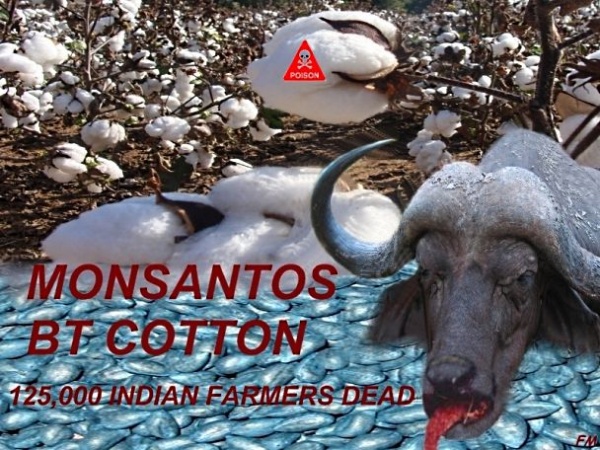Monsanto Loses Indian Legal Battle over GM Cotton Patents
ASIA--PACIFIC, BRICS, JUSTICE, ORGANIC, GMO, GENETIC ENGINEERING, 21 May 2018
Reuters – TRANSCEND Media Service
11 Apr 2018 – A court ruled today that Monsanto (MON.N) cannot claim patents on its genetically modified (GM) cotton seeds in India, the Indian company that brought the case said.
Citing an Indian law that excludes seeds from being patented, Nuziveedu Seeds Ltd (NSL) argued that the U.S. seeds company was not eligible to claim patents and charge royalties from Indian seed companies.
On Wednesday, the Delhi High Court agreed with NSL, ruling that India’s Patent Act does not allow Monsanto any patent cover for its GM cotton seeds, said Narne Murali Krishna, a company secretary for NSL.
A Monsanto India spokesman said the company was “very disappointed” with the court order.
“Today’s order will have wide-ranging, negative implications for biotech-based innovation across many sectors within India, and is inconsistent with other international markets where agricultural innovation has flourished,” the spokesman said in a statement.
Monsanto’s “false claim has got exposed today,” Kalyan Goswami, director general of the National Seed Association of India, said in a statement.
Late last year, NSL said it would not settle a long-standing intellectual property dispute with Monsanto over genetically modified cotton, despite some other Indian companies doing so.
Monsanto has been involved in a long-running battle in India over royalties paid by local seed companies for its GM cotton.
In 2016, the Indian farm ministry cut Monsanto’s royalties by more than 70 percent, triggering a long-running feud that drew in the Indian and U.S. governments.
In March, India cut the royalties paid to Monsanto for its GM cotton for the second time in two years, potentially fuelling another row with the U.S. company that threatened to leave India in 2016.
More than 90 percent of India’s cotton crop is genetically modified.
________________________________________
Reporting by Suchitra Mohanty; editing by Mayank Bhardwaj and Adrian Croft
DISCLAIMER: The statements, views and opinions expressed in pieces republished here are solely those of the authors and do not necessarily represent those of TMS. In accordance with title 17 U.S.C. section 107, this material is distributed without profit to those who have expressed a prior interest in receiving the included information for research and educational purposes. TMS has no affiliation whatsoever with the originator of this article nor is TMS endorsed or sponsored by the originator. “GO TO ORIGINAL” links are provided as a convenience to our readers and allow for verification of authenticity. However, as originating pages are often updated by their originating host sites, the versions posted may not match the versions our readers view when clicking the “GO TO ORIGINAL” links. This site contains copyrighted material the use of which has not always been specifically authorized by the copyright owner. We are making such material available in our efforts to advance understanding of environmental, political, human rights, economic, democracy, scientific, and social justice issues, etc. We believe this constitutes a ‘fair use’ of any such copyrighted material as provided for in section 107 of the US Copyright Law. In accordance with Title 17 U.S.C. Section 107, the material on this site is distributed without profit to those who have expressed a prior interest in receiving the included information for research and educational purposes. For more information go to: http://www.law.cornell.edu/uscode/17/107.shtml. If you wish to use copyrighted material from this site for purposes of your own that go beyond ‘fair use’, you must obtain permission from the copyright owner.
Read more
Click here to go to the current weekly digest or pick another article:
ASIA--PACIFIC:
- Identity Politics, Sexual Politics, and Violence against People in Sri Lanka
- The Hawaiians Who Want Their Nation Back
- The Hidden Meaning of the Martial Law in South Korea
BRICS:
- The “BRICS Sovereigns” vs the “Globalist Oligarchy”
- Cuba Joining BRICS Is a Lifeboat for Its Economy
- BRICS and G20 Value Platforms: A Comparative Analysis
JUSTICE:
- Statement of the ICC Office of the Prosecutor on the Arrest of Former Philippine President Rodrigo Roa Duterte
- Ireland Formally Joins ICJ Genocide Case against Israel
- Good and Bad War Criminals
ORGANIC, GMO, GENETIC ENGINEERING:
